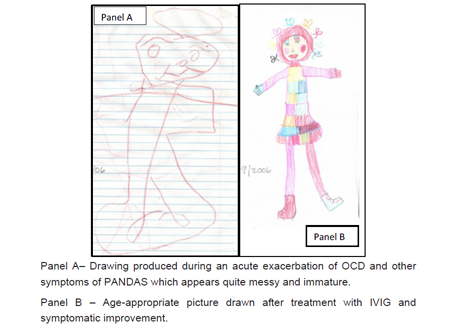Archived Content
The National Institute of Mental Health archives materials that are over 4 years old and no longer being updated. The content on this page is provided for historical reference purposes only and may not reflect current knowledge or information.
Twitter Chat on PANDAS/PANS
NIMH Experts Discuss Childhood Rapid-onset OCD
• Science Update
Most children encounter and surmount streptococcal bacteria (strep) infection—pediatricians can test for it either within minutes via a quick throat swab or days with a throat culture. But sometimes these infections take a turn for the worse and the diagnosis can take longer to determine. Such is the case for Pediatric Autoimmune Neuropsychiatric Disorders Associated with Streptococcal Infections (PANDAS) and its related syndrome Pediatric Acute-onset Neuropsychiatric Syndrome (PANS). In these disorders, children experience dramatic, “overnight” symptoms, including motor or vocal tics and obsessive-compulsive disorder (OCD). With PANS, children can also experience eating disorders, such as anorexia.

To learn more about these disorders that lead to childhood rapid-onset of OCD, please join us Wednesday, May 8, from 11 am to noon ET for a Twitter chat. Sue Swedo, M.D., and her colleague, Paul Grant, M.D., both at the Pediatrics and Developmental Neuroscience Branch at NIMH, will be online to answer questions. Dr. Swedo and her team were the first to identify PANDAS, and more recently PANS, as a subset of childhood OCD. The chat is part of an ongoing campaign to acknowledge National Children’s Mental Health Awareness Day and National Mental Health Awareness Month.
You can find this discussion under #NIMHchats. An archive of the chat will be posted shortly after the event.
Background
National Children’s Mental Health Awareness Day is a national campaign coordinated by the Substance Abuse and Mental Health Services Administration to increase public awareness of children’s mental health. Positive mental health is essential for a child’s development. Local, state and federal partners include advocacy groups, government agencies, service organizations, professional groups and affiliates. This year SAMHSA hopes to increase community involvement by engaging local groups in a national conversation about the importance of children's social and emotional well-being. Local groups are also encouraged to offer individuals attending Awareness Day events an opportunity to become a "hero of hope" by making a pledge to take action to help a child or youth.
President Barack Obama proclaimed May as National Mental Health Awareness Month. He called upon citizens, government agencies, organizations, health care providers and research institutions to “redouble our efforts to address mental health problems in America.” Tens of millions of Americans are living with a mental health problem yet only half receive available treatment.
